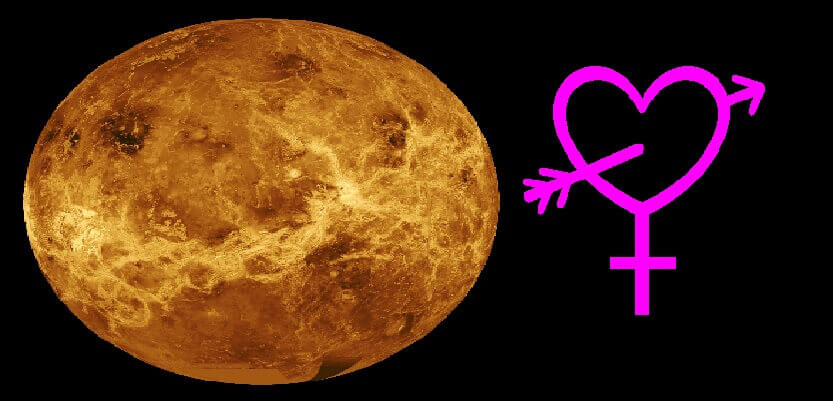Venus is considered as the benefic planet to provide all kinds of material comforts. Venus is the personification of material happiness. It is about material pleasures, happiness, comforts. It represents emotional attachments and harmony in our relationships. Venus is seen as the Goddess of Love. It also signifies passion in an individual.
Venus is termed as ‘Kalatra Karaka’ (spouse) in Vedic astrology, more so in the Men's chart. It signifies love, romance, bed comforts, marital happiness, sensuality, sexual pleasures, etc. When Venus is powerful in some signs, it can make a person very uncontrollable in terms of passion and pleasures. Venus creates a passion to achieve material comforts and goals in life. For example, when Venus is placed strongly in the 7th house without any association, can create an uncontrollable sexual urge in the native. The sexual instincts of the native can be seen as per the placement of Venus in human sign or animal sign. If it is in human sign (Nara rasi), the sexual enjoyment will be humane and so on. Also, other factors such as elements and modalities of signs have to be considered.
Venus is the lord of the 2nd and 7th houses in the natural zodiac or kalapurusha chart, which signifies ‘Anna’ (food) and ‘Bhoga’ (pleasure). It is said in Upanishad that ‘Annat Bhavanti Bhootani’ which means that it is the food that is responsible for the birth of species. He signifies expensive food of high quality and taste, items like fruit salads, ice creams, dry-fruits, etc.
Astrological Significations
Marriage, Income, Women, Wife or Husband, Flowers, Youth, Silver, Good cloths, Beauty, Watery place, Music, Enjoyment, Love, Swimming, Decoration for the dramatic shows, Happiness from sex life, Gentle or benefic, Fame, Pride, Conveyance, Acid taste, Rajasik nature, Pearls, Fashion, Dancing, Precious stones, Kingdom, Fragrant garland, Kapha, Vaata, Diamond, Cow gram, Semen, Minister, Bedroom, Artist, Poet, Perfume, Vehicle, House. Venus is said to be born in Panchala desha in Manmatha Samvatsara, Chaitra shukla Ekadashi, in Magha nakshatra, in Bhargava gotra. He has a wheatish complexion and has four hands. He occupies east in graha mandala and faces east. His weapons are sticks. He holds Kamandala (a pot). He rides in a white-colored chariot. His wife’s name is Sukeerthi. His Shakti devata is Gnanarupa, Adhi devata is Indrani, Pratyadi devata is Indra, and abhiman devata is Lakshmi. Number of japas to be performed is 16000, number of homas to be performed is 1600 and the number of tarpans to be performed is 160. The sacred wood for performing puja is Oudumbara or Atthi. Charu or offering is ghee rice. The flower to be offered is the white lotus. The fire is hatakaagni. Graha shanti is to be performed on Friday in the star of Jyesta. The nama japa to be recited is ‘Om Shukraya Namaha’. The number of japas to be recited is 1008.
Venus rules over Taurus (Vrishabha) and Libra (Tula), Moolatrikona sign is Libra, It is exalted in Pisces and debilitated in Virgo. The Vimshottari dasha period is 20 years. Friends are Mercury and Saturn, enemies are Sun and Moon; finally, Mars and Jupiter are neutral planets.
Body Parts ruled by Venus
Ovary, Eye, Generative system, Kidney, Water content, Semen, Phlegm
Diseases by Venus
Semen loss, urinary problems, Diabetes, Bladder stone, Cataract, Tonsils, Face, Generative organs.
Profession
The profession ruled by Venus are fashion industry, restaurants, creative field, tours and travels, transport, import-export, films, music, jewelry, cosmetic, photography, sex industry, etc.
In Astronomy
Venus is the second nearest planet to the Sun after Mercury. Its mean distance from the Sun is about 67 million miles and its diameter is about 7,500 miles. The maximum inclination of its orbit to the ecliptic is about 3° 24’ on either side of the ecliptic. It is brighter than any other planet. Its sidereal period of revolution is 224.7 days and the synodic period is 584 days. It is never more than 45 degrees from the Sun. As it is near to the Sun, it shines like a shining star just a few hours before sunrise and after sunset. So It is termed as the morning star and evening star.
In Mythology
In Hindu mythology, Shukra is known as the teacher of Asuras or demons. He is said to be born in Panchala desha in Manmatha Samvatsara, Chaitra shukla Ekadashi, in Magha nakshatra, in Bhargava gotra. He is the son of sage Bhrigu. His wife is Khyati. He is known to have the knowledge of ‘Sanjeevani Vidya’, which he gained from Lord Shiva. With this knowledge, he was able to bring life to the dead. Shukra and Brihaspati are students of Sage Angirasa at a younger age. Both are known to be enemies to each other. Brihaspati became the teacher of Devas while Shukracharya became the teacher of Asuras.






